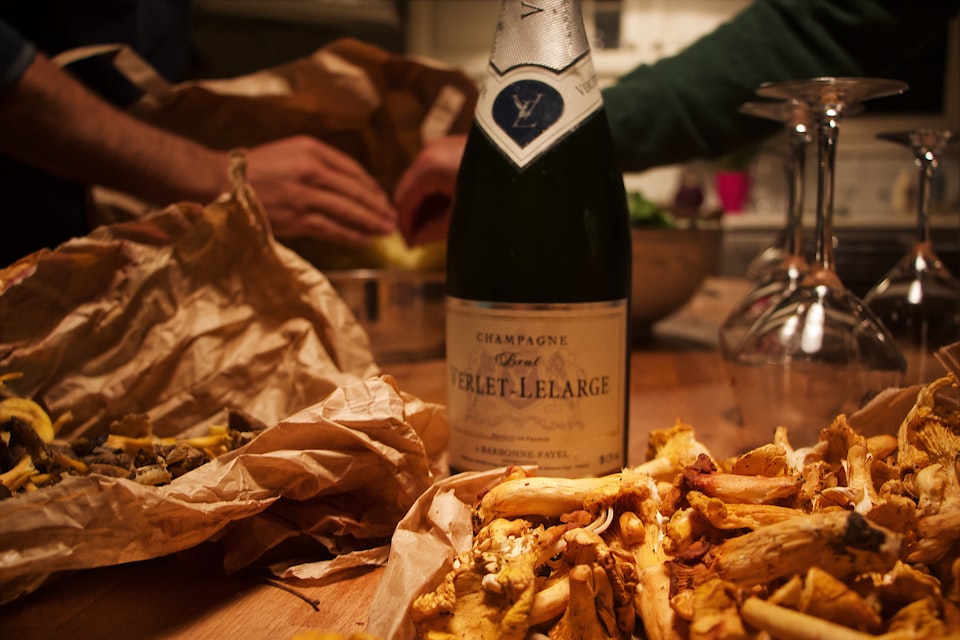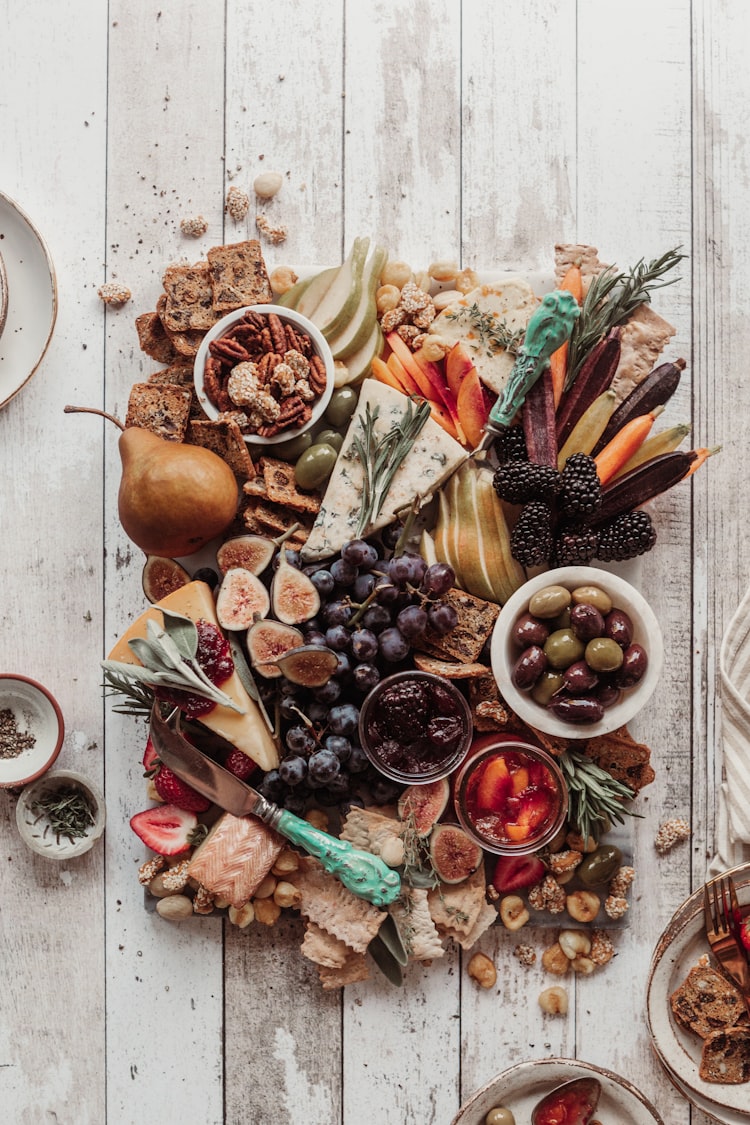Having People Over

Subscribe to Stone Soup to get updates, recipes, and book recommendations in your inbox every week.
There’s the rush of everyone arriving, taking off coats and putting down bags, tendering a bottle of wine or a bouquet. I like to wear an apron when I cook—the one I have is heavy-duty, with straps that cross in the back and large pockets and a strap for a kitchen towel to hang from—and I’m still wearing it as I hug my friends, but none of the mysterious kitchen dust that’s on me transfers to them. They have brought a salad or a dessert or a book to lend; we are all delighted. The cats are hiding.
There’s the first movement of the evening—everyone is settling in, and we are all surprised to already be hungry. Lately I’ve been making Welcome Snacks—something to have ready when my guests show up, something that’s low-key and low-stakes. This kind of dish releases the pressure during that moment of bustle when everyone is settling into their hunger. It’s friendlier than an hors d'oeuvre, more relaxed than an appetizer, less self-important than an amuse-bouche. The Welcome Snack is always available but never formal; it is special enough to excite, but it demands nothing of the guest. Butterscotch-drizzled popcorn, warm spiced nuts, sugared clementine segments; cream cheese whipped with Calabrian chili paste, honey, and lemon, piled up in a bowl next to a huge mess of halved figs.
There are drinks before dinner—sometimes with booze, sometimes without. There are options, and no option is an afterthought. The water is chilled and has lemon or cucumber slices floating in it; there is a new bottle of bitters in an unfamiliar flavor like pink peppercorn or sassafras; the wine is already open, the kettle is already hot for tea. It’s a delight to make a cocktail, it’s a delight to make a mocktail, nothing is any trouble. I am cooking. Maybe someone else is cooking with me—I recently purchased a second apron for guests, am learning how to invite people into the kitchen, am even learning how to be cooked for instead of just with. There is always plenty to talk about.
When dinner is almost ready, everyone sets the big wooden table. We add leaves to extend the table’s surface if we are many, and leave it alone if we are few; the folding dining chairs get set up, and I think, every time, that I’m long overdue to find permanent ones. The tablecloth is dark linen, hard to stain and easy to wash and pretty to look at; the table runner is colorful and thick enough to support a hot dish without needing a trivet, although I will use a trivet anyway because I am an anxious person. There are cloth napkins, which I resisted for years but which are, it turns out, worth the effort of washing and folding—bright linen, lovely against the dark tablecloth and pleasant to fidget with. The plates don’t match. Neither do the forks. No one will notice.
We toast. Red wine, whiskey, gin and tonic, sparkling water. In my house, we say cheers to queers followed, always, by fuck fascism. In other houses, every day of the week comes with its own toast. I wonder, every time, what other people in other homes are raising their glasses to. I wonder if the drink in my glass would taste as good if it was left unconsecrated.
A lot of talking while everyone serves themselves and each other, and then a lull as everyone takes their first bites. There is a side that always could have been simpler—pommes Anna brushed with compound butter, roasted vegetables tossed in a berbere spice blend, miso-horseradish slaw with crunchy seaweed. There is a main dish I will think turned out badly until I taste it—I’ve improvised a marinade for a cut of beef I’ve never cooked before, I’ve pan-fried the salmon instead of baking it, I’m not sure whether the breading I’ve used will suit the tofu. Things always turn out better than I think they will. There’s another side someone else brought that will end up being all I want to eat. There is always some kind of sauce, because I cannot resist sauce. Salt and pepper are on the table in spherical grinders, hand-carved by a guy in Germany who taught me the difference between eiche and esche. These orbs please me beyond reason.
Always, the meal is on the table twenty to thirty minutes later than I intended, but no one minds. Always, we stay at the table long enough for second and third helpings to find their way to the plates of people who have proclaimed themselves full, too full to eat more, but, well, maybe just a little wouldn’t hurt. Always, I feel myself falling a little in love with everyone there.
We retire to lounge alligatorlike on gentler surfaces. There are more small blankets than people, a side effect of my desire to live in a series of increasingly soft nests. Maybe there is a fire in the fireplace, a kiss of smoke in the air because the flue was cold at first. Everyone is a little sleepy. Nobody really wants after-dinner drinks these days, but I still offer—a habit I haven’t really tried too hard to break. The cats have joined us and are making nuisances of themselves; everyone is delighted by them, which is their entire experience of the world. They have never met a person who didn’t wholeheartedly adore them.
After a little while, there is dessert. I fuss enormously over dessert. The dessert plates and forks are small. Everyone will protest that they’re too full to eat much more and only want a small slice, a tiny square, half a scoop. It’s a mocha-hazelnut cheesecake, it’s a raspberry lemonade cake with raspberry glaze, it’s peppermint brownies with marshmallow icing. I will be so excited to explain the dessert, nakedly thrilled with myself for having complicated something that could have been simple. It is a delight to add complication. I don’t bother trying to be subtle about this. My loved ones are blessedly indulgent about it. There are often seconds.
We say goodbye—coats, shoes, hugs, a last shout of affection. There are candles to be blown out, leftovers to be put away, dishes to be ignored until morning. Sleep will come easy.
I can’t wait for next time.
Coming Up This Month
- Hilary’s Mac & Cheese
Hilary B. Bisenieks, author and host of the brilliant writing podcast Tales from the Trunk, shares a recipe for macaroni and cheese.
Their essay on grief, memory, and trusting the process will be in your inbox on April 12.
Find them on Twitter and Instagram. - Shing Yin’s Congee
Shing Yin Khor, Eisner-winning and National Book Award finalist cartoonist of The Legend of Auntie Po, shares a recipe for congee.
Their essay on falling in love with large group cooking, meal planning, and simple recipes will be in your inbox on April 26.
Find them on Twitter and Instagram.
If you’d like to own the Personal Canons Cookbook ebook, which collects all these essays and recipes in easy-to-reference, clickable format—plus loads of bonus recipes from me!—join the Stone Soup Supper Club. The ebook is free for subscribers, who will get the download link in their inboxes in the first Supper Club email of 2024!
If you’re a paying subscriber, come by the Stone Soup Supper Club for early access to this month’s recipes, our weekly chat, and more community! I can’t wait to find out how you’re doing.
—Gailey






Member discussion